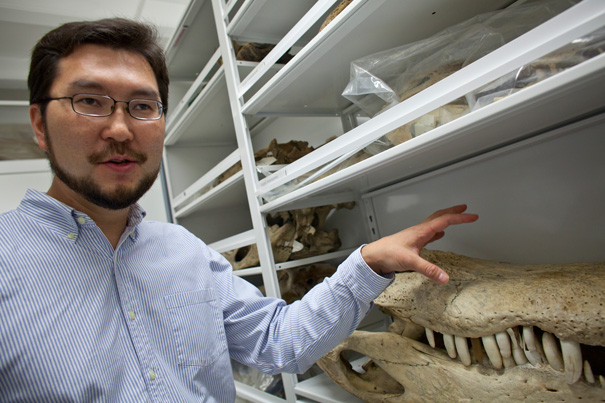Health
-
Lin Test
text with link. This is a quiz. Some text Name Name Quo modo autem philosophus loquitur? Tecum optime, deinde etiam cum mediocri amico. Invidiosum nomen est, infame, suspectum. Name Name…
-

Gender-affirming care is rare, study says
Fewer than 1 in 1,000 transgender youth receive hormones or puberty blockers

-

Nature offers novel approach to oral wound care
Slug’s sticky mucus inspiration behind adhesive hydrogel that can seal wounds in wet environment

-

Time for a rethink of colonoscopy guidelines?
Change informed by new findings would help specialists focus on those most at risk, researcher says

-

Should pharmacists be moral gatekeepers?
‘The problem is not opioids,’ says author of ‘Policing Patients’ — it’s overdose, pain
-

The deadly habit we can’t quite kick
Actions by tobacco companies worry researcher even amid ‘dramatic decrease’ in smoking among young Americans

-
Giving phobias a rest
A Harvard-led research team has found that exposure therapy for irrational fear of spiders seems to be more effective if it is followed by sleep, according to a recent study in the Journal of Psychiatric Research.

-
Artificial jellyfish swims in a heartbeat
A team of researchers at Harvard University and the California Institute of Technology has turned inanimate silicon and living cardiac muscle cells into a freely swimming “jellyfish.”

-
Mushroom relations
Harvard researchers are using one of the most comprehensive fungal “family trees” ever created to unlock evolutionary secrets.
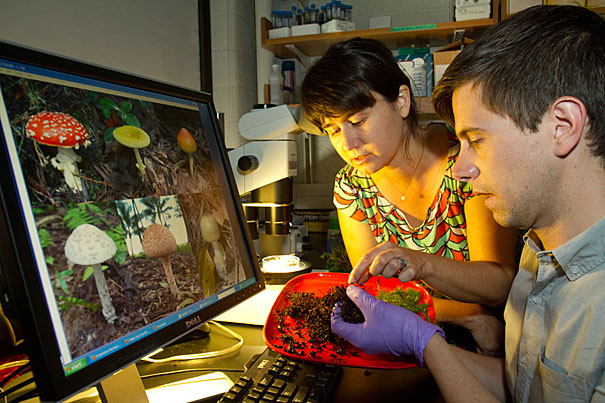
-
Women pay high price for high job strain
New research from Brigham and Women’s Hospital (BWH) finds that women with high job strain are more likely to experience a cardiovascular-related event compared with women with low job strain. These findings are published in the open access journal PLoS ONE.

-
Cancer care comes to Rwanda
Paul Farmer, chair of Harvard Medical School’s Department of Global Health and Social Medicine and co-founder of Partners In Health, announced the opening of Butaro Cancer Center of Excellence, which will serve as the first national cancer referral facility in rural Rwanda.
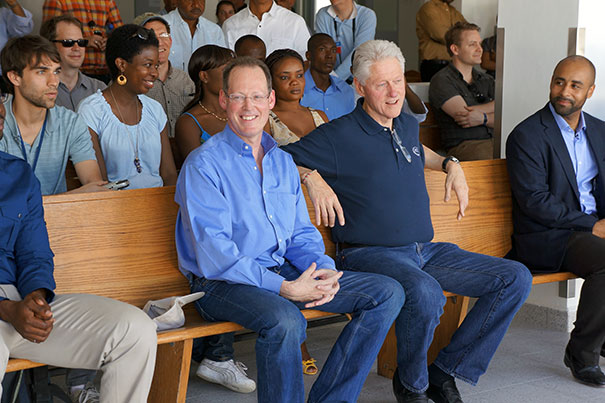
-
Doctor knots
Harvard researchers have developed a method to determine the effect of social networks among doctors on cost and quality of care across the nation.
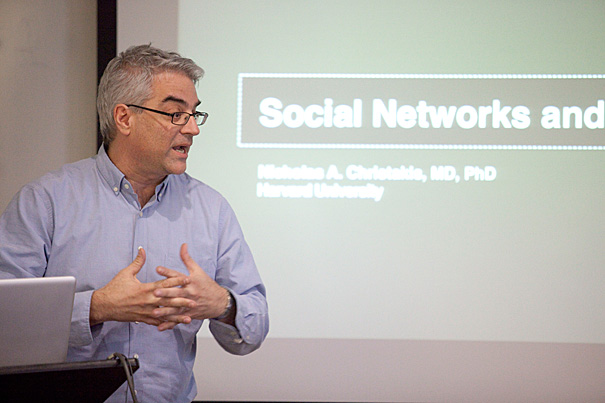
-
Personalized medicine closer to reality
A consortium of scientists at 20 institutions, led by a principal faculty member at the Harvard Stem Cell Institute, has used stem cells to take a major step toward developing personalized medicine to treat Parkinson’s disease.
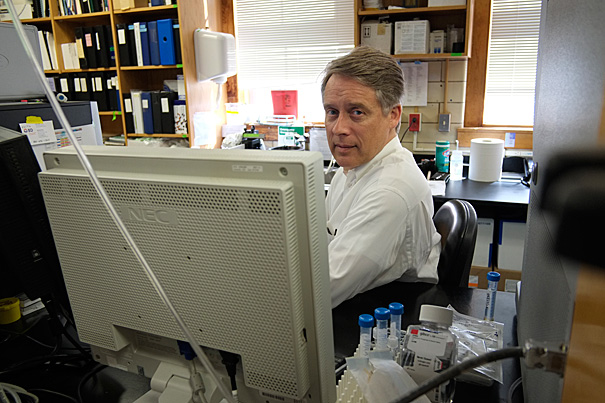
-
In obesity battle, beige is the new brown
Scientists at Harvard-affiliated Dana-Farber Cancer Institute have isolated a new type of energy-burning fat cell in adult humans, which they say may have therapeutic potential for treating obesity.
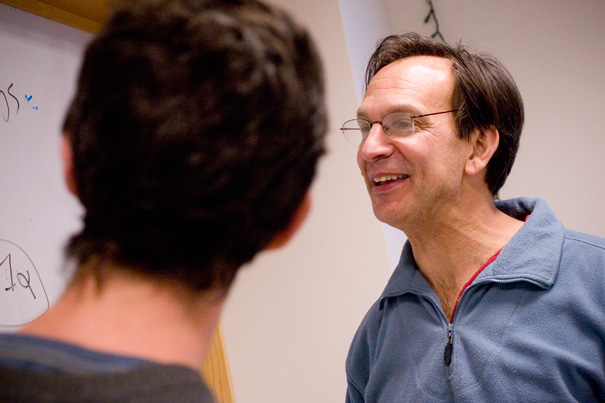
-
Moving beyond health care’s fee-for-service
Harvard researchers find that global budgets for health care, an alternative to the traditional fee-for-service model of reimbursement, can slow the growth of medical spending and improve the quality of care for patients.

-
Transforming cancer treatment
Professor Martin Nowak is one of several co-authors of a paper, published in Nature on June 28,that outlines a new approach to cancer treatment that could make many cancers manageable, if not curable, by overcoming resistance to certain drug treatments.
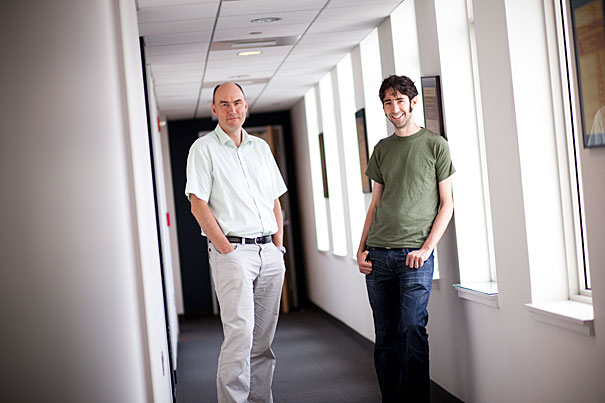
-
One million species, and counting
Just weeks after adding its millionth Web page, the online biology clearinghouse called the Encyclopedia of Life (EOL) has received a grant from the Sloan Foundation that will allow it to continue its mission of documenting every living plant and animal species on the globe.
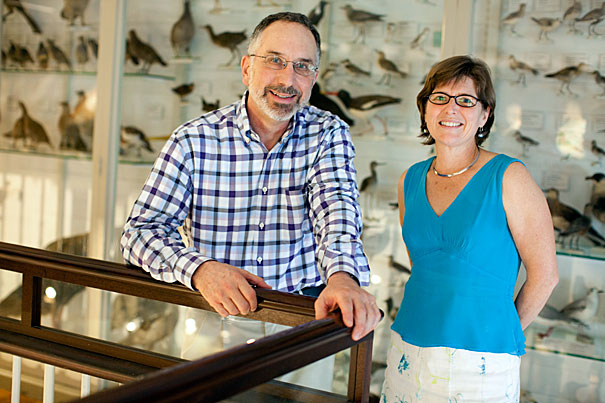
-
The positives of playing favorites
As described in a paper in Scientific Reports, a study led by Feng Fu, a postdoctoral researcher at Harvard’s Program for Evolutionary Dynamics, found that in-group favoritism — the tendency of people to help other members of the same group — is critical in establishing high-level cooperation that ultimately benefits the whole.
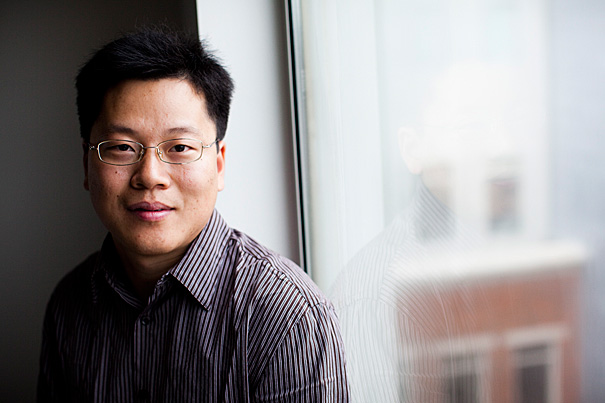
-
Clot-busting technology goes straight to work
Researchers at the Wyss Institute for Biologically Inspired Engineering at Harvard have developed a novel biomimetic strategy that delivers life-saving nanotherapeutics directly to obstructed blood vessels, dissolving blood clots before they cause serious damage or even death.
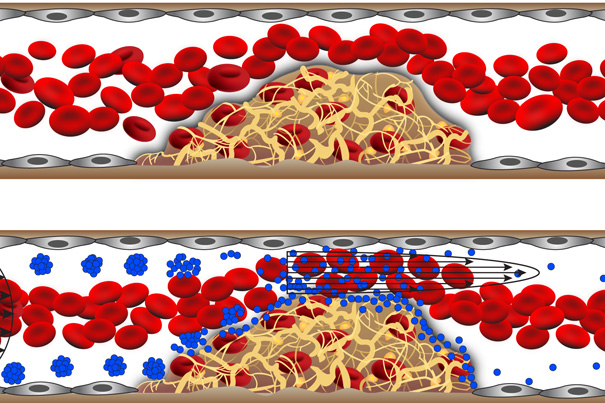
-
When skin cancer cells resist drug treatment
Harvard researchers have found that although tailored drugs can eradicate melanoma cells in the lab, they often produce only partial, temporary responses in patients. Researchers have now learned that normal cells that reside within the tumor, part of the tumor microenvironment, may supply factors that help cancer cells grow and survive despite the presence of anti-cancer drugs.
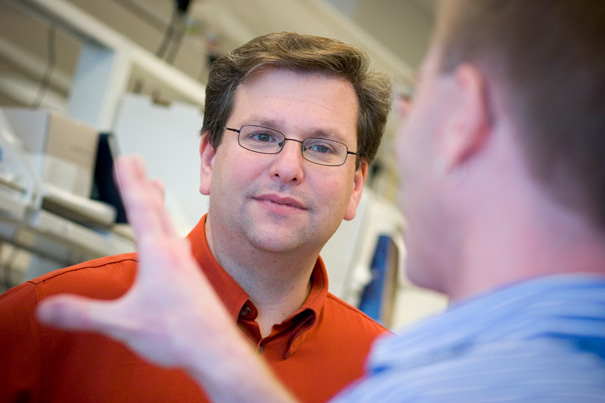
-
Worry over drug-resistant TB
A symposium at the Broad Institute calls for mobilization to battle drug-resistant tuberculosis.

-
Win for Obama, but no let-up in debate
The U.S. Supreme Court decision on Thursday upholding the basis of national health care reform is far from the last word on the topic, Harvard faculty members said, and merely raises the curtain on act two: November’s general election.

-
When a calorie is not just a calorie
A new study by Harvard researchers and published in the Journal of the American Medical Association (JAMA) challenges the notion that “a calorie is a calorie.”
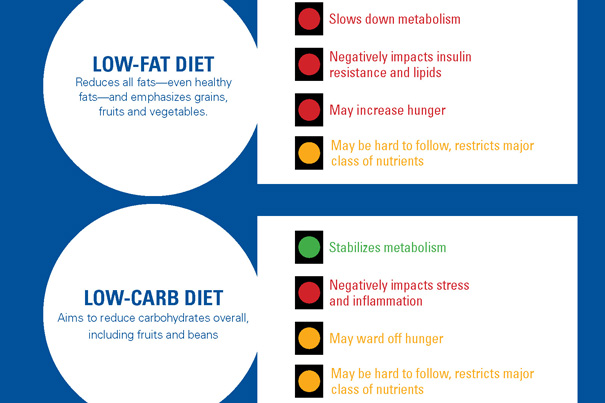
-
Heart attack worsens atherosclerosis
Researchers at Harvard Medical School and Harvard-affiliated Massachusetts General Hospital have found that the body’s immune response to heart attacks actually worsens atherosclerosis, increasing future heart attack risk, according to a study published in the journal Nature.

-
Life partner
Researchers in the Harvard lab of Bauer Fellow Peter Turnbaugh are seeking to understand how the microbes that live in our intestines affect the drugs we take and the food we eat.
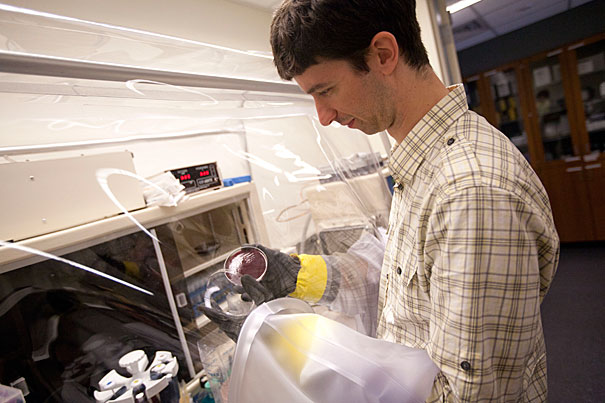
-
The growing brain
As reported on June 7 in the journal Neuron, a team of researchers led by Professor Jeff Lichtman has found that just days before birth mice undergo an explosion of neuromuscular branching. At birth, the research showed, some muscle fibers are contacted by as many as 10 nerve cells. Within days, however, all but one of those connections had been pruned away.
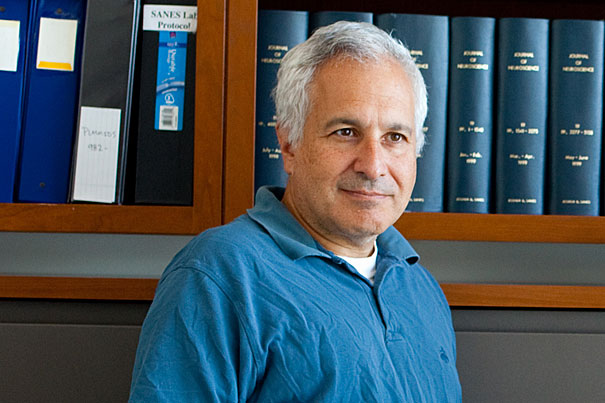
-
My microbes
A new study reports that the superabundance of microbial life lining our GI tracts has co-evolved with us. These bacteria, which are essential for a healthy immune system, are ultimately our evolutionary partners.
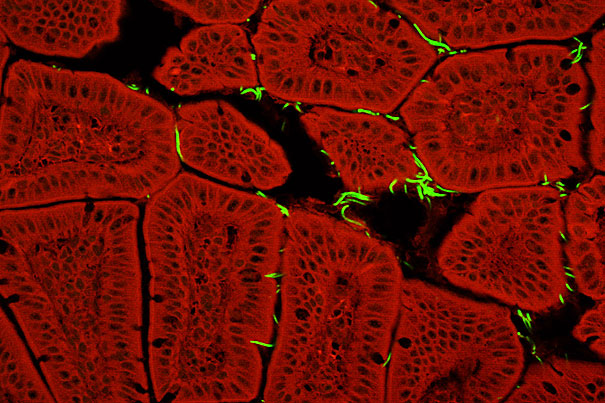
-
Brigham team implants artificial heart
The first complete artificial heart transplant in New England was performed at Harvard-affiliated Brigham and Women’s Hospital.
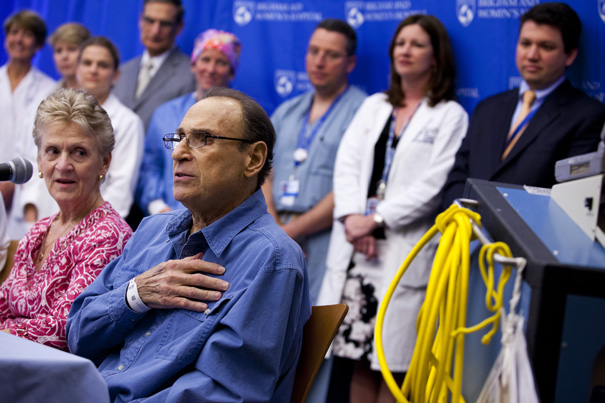
-
Climbing out of hiding
For decades, scientists have been stymied in their attempts to better understand proboscis anole, a small lizard whose defining feature is a horn on its nose, because it appeared to be all but extinct — until now.

-
The problem of pre-existing mutations
In a critical step that may lead to more-effective HIV treatments, Harvard scientists have found that, in a small number of HIV patients, pre-existing mutations in the virus can cause it to develop resistance to the drugs used to slow the progression of the disease.
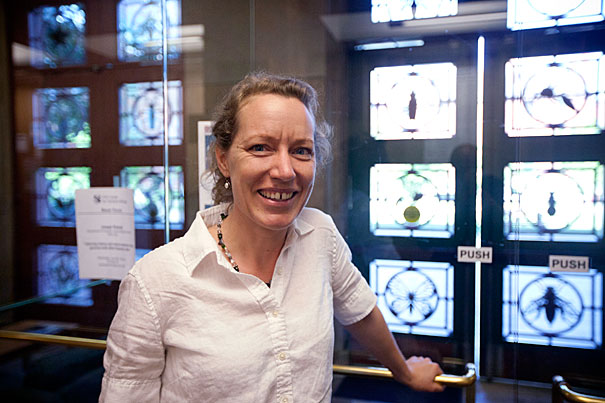
-
Tracing the brain’s connections
A team of researchers is using a genetically modified version of the rabies virus to create the first comprehensive list of inputs that connect directly to dopamine neurons in two regions of the brain.
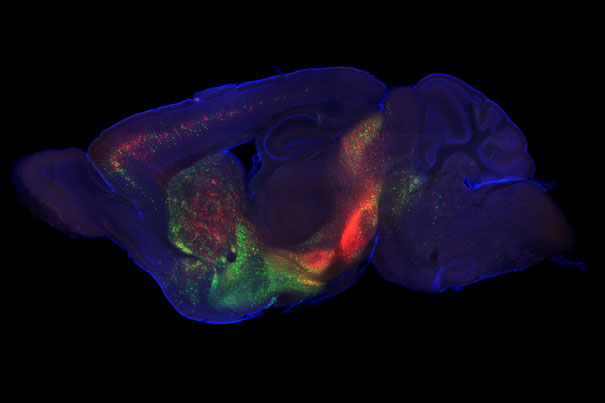
-
Mapping microbes in people
New studies involving Harvard School of Public Health researchers have helped to identify and analyze the vast human “microbiome,” the more than 5 million microbial genes in the body.
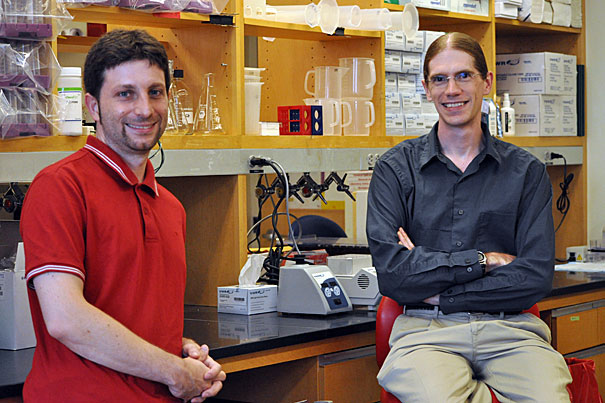
-
Training leaders for malaria fight
A group of mid-career officials gathered at Harvard Business School for an intensive course focused on educating a generation of leaders for the global campaign to eradicate malaria.

-
‘Stealing’ life’s building blocks
Researchers have found that a parasitic flower takes large portions of its genetic code from its host, and that some genes borrowed by the flowers may even be functional. The surprising finding suggests that the process may convey some evolutionary advantage to the flowers.
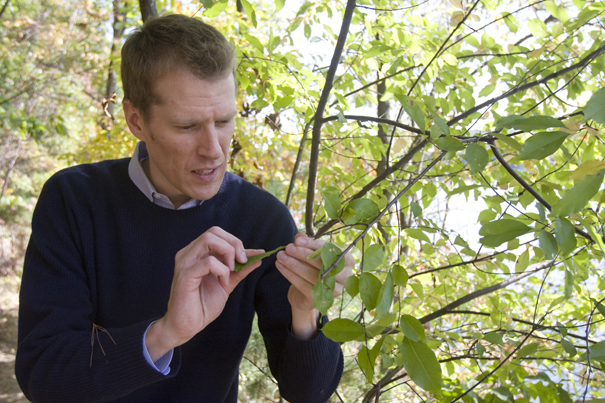
-
Exercise reduces psoriasis risk
A study by researchers at Harvard-affiliated Brigham and Women’s Hospital adds to the list of medical problems that exercise eases, showing that vigorous activity reduces a woman’s risk of developing the skin condition psoriasis by 25 to 30 percent over the study subject who exercised the least.
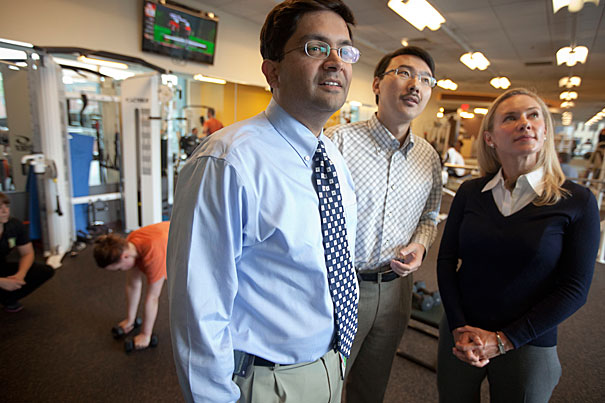
-
Probing the sparrow’s beastly past
A new study led by Harvard scientists shows that birds are, essentially, living dinosaurs, with skulls that are remarkably similar to those of their juvenile ancestors.
